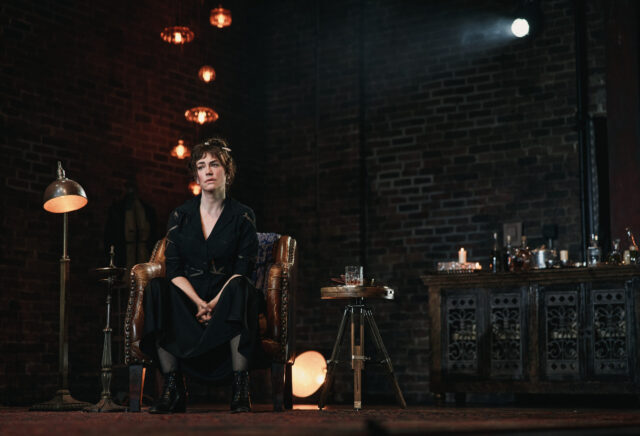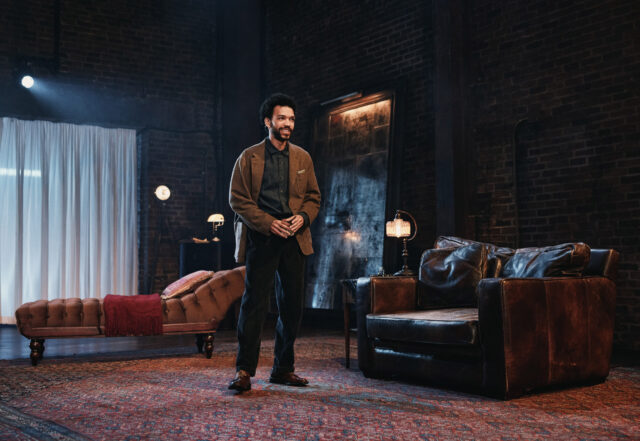
Gustav (Liev Schreiber) is a master manipulator in Jen Silverman’s adaptation of August Strindberg’s Creditors(photo by Emilio Madrid)
CREDITORS
Audible’s Minetta Lane Theatre
18 Minetta Lane between Sixth Ave. and MacDougal St.
Through June 18, $35-$298.50
www.audible.com
“Would you rather be the parasite or the host?” Gustav (Liev Schreiber) asks Adi (Justice Smith) in Jen Silverman’s superb modernization of August Strindberg’s 1889 drama, Creditors. It’s a question that lies at the heart of the seldom-performed play, currently running in repertory through June 18 with Hannah Moscovitch’s Sexual Misconduct of the Middle Classes at Audible’s Minetta Lane Theatre, kicking off Together, a new company founded by Hugh Jackman and Sonia Friedman to “offer audiences a chance to experience theater in a fresh and engaging way.”
The ninety-minute play takes place at a seaside resort at an unidentified time, though before cell phones. Adi is there with his wife, Tekla (Maggie Siff), who is riding high on the success of her debut novel, a roman à clef about her first marriage. While she is off at readings, signings, and parties, the younger Adi is examining his career as an artist.
Brett J. Banakis and Christine Jones’s set features a small bar stage left, a comfortable chair and night table, a two-person couch, a fancy chaise longue, an old floor mirror against the bare brick back wall, and a glass door with a large white curtain stage right. When the show begins, Adi is in the parlor with an older, serious gentleman, Gustav (Liev Schreiber), who sips Scotch as they talk about art, love, and loyalty. Gustav looks and acts like a psychiatrist, asking penetrating questions that intrigue Adi — until Gustav, acting concerned about Tekla’s flirtatious behavior when she’s not with her husband, pounces.

Tekla (Maggie Siff) is caught between the past and the present in Together/Audible revival at Minetta Lane (photo by Emilio Madrid)
Gustav: You don’t get bored?
Adi: Oh, it’s impossible to get bored when you’re with her. You’ll see! I’m excited for you two to meet — she’s one of a kind.
Gustav: She must be. [lifts his glass] To young love!
Adi: I’ve loved your company this week. I mean what you were saying yesterday — about sculpture instead of painting, how sculpture is the only real way to grasp — I could feel my whole soul wake up.
Gustav: You don’t wonder who she’s with?
Adi: I’m sorry?
Gustav: When she’s out all night.
Adi: She’s giving a reading.
Gustav: Sure, but maybe there was a dinner before, or drinks after . . .
Adi: I’m not a jealous man.
Gustav: Maybe you should work on that.
Adi is like wet clay in Gustav’s formidable hands; as he manipulates Adi into questioning Tekla’s faithfulness and the control she has over him, it becomes apparent just who Gustav is: Tekla’s ex, the man she has written so vividly and openly about in her novel. However, Adi does not catch on, making him easy prey.
In the second scene, Adi confronts Tekla, who is shocked by his sudden change. She had been worried that she would end up losing Adi to a younger woman as his stature in the art world grew, but this is not the Adi she married. She wants to know who Adi has been talking to, sure that someone has put these ideas into his head. “You’re desperately loyal, Adi,” she tells him. “But where you are not loyal is to your own convictions. Your thoughts are so easily taken and shaped and handed back to you, and you accept them as if they’re still yours.”
In the third scene, Gustav reveals his devious scheme to Tekla and exposes himself like never before.

Adi (Justice Smith) is like a lump of clay in Creditors (photo by Emilio Madrid)
Creditors is seldom produced, and you’re likely to wonder why after seeing this excellent version. In 1977, the Public staged it with Rip Torn directing and playing Gustav to Geraldine Page’s Tekla and John Heard’s Adolf; Classic Stage presented it in 1992, with Caroline Lagerfelt, Nestor Serrano, and Zach Grenier, and Alan Rickman directed an adaptation in 2010 at BAM with Anna Chancellor, Owen Teale, and Tom Burke.
Creditors is not about money or finance; there is no talk of business deals. Instead, it’s about the physical, emotional, and psychological burdens that come with romantic relationships, male friendship, and artistic endeavors, particularly trust and jealousy.
In describing to Adi how Tekla might be unfaithful, Gustav says, “So then there’s the husband. The husband must be told — eventually, but not yet, after all he’s so far away! And yet . . . he’s right here. He takes on form and substance, the idea of him I mean, he enters every room you’re both in. He sits between you in a third empty chair, he eats the breakfast out of your bowl, he lies in the same bed the two of you now share. Oh, he doesn’t say anything, he doesn’t stop you. But he spreads poison. You owe him your happiness after all. Sooner or later, he’ll show up to collect the debt. And even if he never does, he’s still always there in the back of both of your minds.”
Later, Gustav explains to Tekla, “There is no out. Even if I weren’t here, Adi would live his life wondering if we still have an old debt between us, wondering if he can live with the uncertainty, wondering — is that my shadow, between you two? And these questions, Tekla. They will eat him like acid.”
The Swedish Strindberg, who was also a novelist and a painter, named the two male characters after Gustav II Adolf, the king who led Sweden during the Thirty Years’ War, a reference to the ongoing battle between men, in this case over a woman; Strindberg would shortly write the history play Gustaf Adolf. Meanwhile the female character is named for Saint Tekla, the virgin martyr and role model who fought off male aggression and preached chastity, honored by the church as “the glory of women and guide for the suffering, opening up the way through every torment.”
As he does with Sexual Misconduct of the Middle Classes, director Ian Rickson makes full use of the stage, the pace a kind of cat-and-mouse game among three complex characters. Mikaal Sulaiman’s sound design is highlighted by an undercurrent of drone music at key points, upping the suspense. Ásta Bennie Hostetter’s costumes firmly establish the trio, from the paint splatters on Adi’s pants to Gustav’s professorial demeanor and Tekla’s free spirit.
Silverman (Collective Rage: A Play in 5 Betties, Spain) has made several important cuts and changes to Strindberg’s original. There are no epileptic fits, Tekla drops a few F-bombs, and the ending is completely different, but Silverman’s dialogue is clear and concise for this moment in time. Smith (Yen, The Mother) portrays Adi with a tender sensitivity, suddenly unsure of the world that he is now a part of. Siff (Breaking the Story, Curse of the Starving Class) ably balances Tekla’s lust for life with an unexpected vulnerability. And Tony winner and nine-time Emmy nominee Schreiber (Doubt, Glengarry Glen Ross) is mesmerizing as Gustav, an intense operator who knows just what to say to get under everyone’s skin; I would be terrified to sit opposite him, afraid I would fall for his machinations. Schreiber is so good in the part that even when, in the second scene, he had to call out for the next line — quickly supplied by a stage manager — he handled it without breaking character or interrupting the flow, a sign of just how professional and talented he is.
Creditors and Sexual Misconduct of the Middle Classes get the Together/Audible collaboration to a flying start, led by a pair of marvel-ous superheroes (Jackman/Wolverine, Schreiber/Sabretooth) reveling in playing contemporary men, flaws and all.
[Mark Rifkin is a Brooklyn-born, Manhattan-based writer and editor; you can follow him on Substack here.]